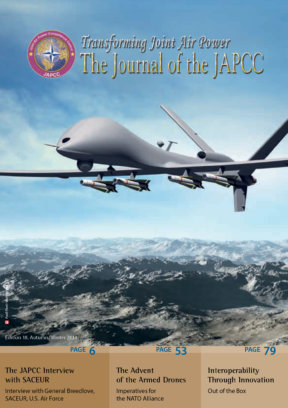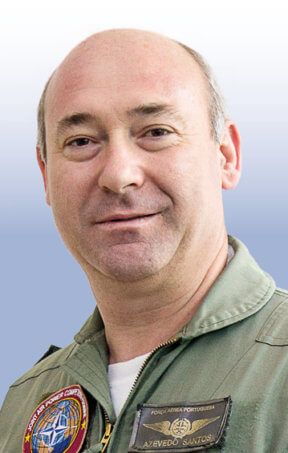“… beyond our [Alliance] frontiers there is uncertainty and insecurity, … my first and enduring priority will be to ensure that NATO remains vigilant and prepared to meet the challenges and threats of the future.”
General Philip Mark Breedlove, USAF, SACEUR, 13 May 2013
Introduction
Europe is part of an area of influence where conflict between neighbours arises from aspects of ethnic, religious and border disputes. However, there are some more relevant factors that feed into this conflict. In fact, in the wake of the end of the Cold War and the advent of the globalisation phenomenon, the world has seen the emergence of new and complex problems which put national sovereignty and security at risk.
Political and economic developments eventually fostered a remarkable change of position in the world order. Indeed, the re-characterisation of the strategic threats has led nations to rethink their defence policies; leading them to be more involved outside their physical boundaries. This new attitude was in the name of safeguarding security and territorial integrity and the promotion of peace, through a strategic-political approach, adjusted to a greater international scale.
Relationship as Part of the Stability
The creation of NATO was part of a broader effort by Western nations to serve various strategic purposes. Deterring Soviet expansionism was one of the most important purposes for NATO’s creation and it characterised and defined the NATO body. After the Cold War, NATO member states felt it necessary to enlarge their Alliance by creating a new ‘pan-European security architecture’1.
The Euro-Atlantic Partnership Council2, established in 1997, set the Allies together with their Central European, Eastern European, and Central Asian neighbours for joint consultations and cooperation. These Partners saw a “relationship with NATO as fundamental to their own aspirations for stability, democracy, and European integration”. This cooperation enlarged the stability arc, but it is important to take into account some other areas which might affect stability and security. One should be aware that radial stability drives the central security in any given area. As such, stability and support of humanitarian crises are important to Africa, but should also be of concern to NATO.
Building Air Transport Capabilities in Africa
During the Military Airlift SMI Conference, in Amsterdam, Colonel Birane Diop from the Senegalese Air Force (Armée de l’Air Sénégalaise) gave a presentation on the need for the Africa countries to start cooperating in strategic air transport. His remarks were clear, stating that “Africa should have cooperation for strategic airlift capabilities”. Africa is constantly dependent on international partners for airlift, and this does not serve its nations well. Most African nations don’t have the capacity to manage medium to large scale humanitarian crises. Despite some African nations having an abundance of natural resources, they still face many challenges: health, food, discrimination, etc.
Some African nations are trying to engage a plan to go forward with the idea of a coordinated African airlift capability. They agree that it is time to start more participation and cooperation amongst African countries to improve their capabilities. During the Regional Air Chief Conference in Dakar, Senegal, August 2012, Nigerian Air Marshall M.D. Umar, Chief of the Nigerian Air Force, stated, “Participation and cooperation (amongst African countries) is key to the improvement of our capabilities, our personnel readiness and the multiple challenges and security challenges in the region”. The aim of this conference was to a start discussion about possible initiatives concerning regional partnerships, because they need to find “African solutions to African challenges”. “Strategic airlift remains a critical supporting capability that should be achieved, maintained and improved. A systematic use of pooled and shared (strategic airlift) assets would reduce duplication, overhead and medium and long-term capabilities”, said Ghana Air Force Wing Commander, Nana Adu-Gyamfi3.
Cooperation Forces a Significant Mind-Set Change
Sharing capabilities will result in major cultural shifts within nations. NATO has been dealing with this issue for many years, and many NATO member nations have experienced the difficulty of multinational deployments and redeployments. In Africa, this concept shouldn’t be any different; in fact, some of its countries are already willing to step forward with this big change, which is a good starting point.
The Alliance built the Partnership for Peace (PfP) programme, which allowed non-NATO countries to share information with NATO and modernise their armed forces in line with modern democratic standards. As such, there is a role that NATO can play to do more to help those African countries that are willing to cooperate in a more robust way.
Cooperation already extends to the south of Europe, where the Alliance founded the Mediterranean Dialogue. NATO’s Mediterranean Dialogue was initiated in 1994 and involves seven non-NATO countries of the Mediterranean region: Algeria, Egypt, Israel, Jordan, Mauritania, Morocco and Tunisia. The Dialogue reflects the Alliance’s view that security in Europe is closely linked to security and stability in the Mediterranean. It is an integral part of NATO’s adaptation to the post-Cold War security environment, as well as an important component of the Alliance’s policy of outreach and cooperation. The Mediterranean Dialogue’s objectives in principal are to: “contribute to regional security and stability; to achieve better mutual understanding; and to dispel any misconceptions about NATO among Dialogue countries”. However, it is not enough to focus on stability in this region alone. We should not glance towards Africa with the ‘tyranny of distance’ and ignore its many problems both old and new. The growing problems south of the Mediterranean are becoming an increasing risk to NATO’s security. To counter this emerging problem, NATO should promote an enlargement dialogue to include more countries and not just maintain the ‘status quo’.
Concerns in Africa
The media shows a variety of significant issues regarding the African continent. Some of the problems affecting this region include: the poor economic situation; proliferation of extremism, challenges to democratisation, terrorism, piracy, etc. All the instability and the dominance of outlaw groups in large areas of the continent, could be the utmost reason for considerably more work between African nations and NATO. An increased and more effective cooperation and relationship that NATO, as an alliance, could have with African countries is definitely required. In this aspect, the African Union (AU) should be the conduit for cooperation between NATO and its African member nations and the AU should set the requirements for cooperation and should be the entity leading any African Partnership.
At the NATO Summit in Lisbon 2010, several priorities were identified, which included fighting terrorism and piracy. At this high level event, member states agreed that the Alliance should continue with an open way to increase cooperation with other nations, and stated that “we agreed to further enhance our existing partnerships and to develop new ones with interested countries and organisations”.
NATO already provides assistance to AU missions, but, this can be a deeper engagement by providing capacity-building support within different areas of operations. Considering some nations are willing to cooperate in the air transport environment, NATO could promote this spirit of cooperation fostering the opportunity for African nations to start building an air transport fleet and have their own air transport capacity.
Instability or conflict beyond NATO borders can directly threaten Alliance security, by fostering extremism, terrorism, and transnational illegal activities such as trafficking in arms, narcotics and people. At the request of the AU, the Alliance could promote a comprehensive defence strategy by giving training assistance and promoting standardisation in a cooperative environment. This would be an appreciated act of assistance for a continent facing the challenges of the aforementioned threats. As an example, the Gulf of Guinea Commission is trying to find mechanisms through their nations to have a force to protect the area against piracy, which is affecting not only their security, but all other nations crossing the Gulf of Guinea. Because this problem has wide-ranging negative impact, any possible solution to the problem should involve both nations in that AOR and the international community that relies on trade routes that transit this area.
Developing Cooperation, the Way Ahead
NATO is already providing, at the AU’s request, training opportunities and capacity building support to the AU’s long term peacekeeping capabilities, in particular the African Standby Force. However, this is not enough. NATO should also support the AU’s desire to develop Air Transport capabilities for the support of their daily humanitarian and military needs to provide to the maximum extent possible, a secured and stabled situation in Africa. The Alliance and the AU are developing a ‘very positive’ relationship, according to the Head of the Peace Support Operations Division (PSOD) of the AU, Mr Sivuyile Thandikhaya Bam, but nevertheless the AU desires to build up and expand collaboration in others areas.
As such, NATO can give not only support to ground troops but effective air training support and advice for AU forces to reach an operational standard able to face humanitarian crises across African Continent by moving personnel and cargo throughout the ‘tyranny of distance’. If interested nations were given the chance to have improved support, they would gain valuable hands-on experience and be better equipped and trained to handle their transport challenges.
Future challenges are not only facing the Africa Continent but also facing NATO. In the past twenty years, global economic power has shifted to the Pacific Rim and the United States has started to shift its military focus toward this region. Consequently, NATO military power in Europe will be diminished, opening the door for questions about the continued strength of the North Atlantic Alliance. NATO cannot be allowed to become irrelevant nor can it risk reduction of its current level of security; in that vein, politicians should consider expanding their focus outside their current field of vision.
Conclusion
If NATO paid more attention to Africa, it could lead to a greater understanding and help build greater security and economic stability in the area. This is achievable, if one considers that the area can give to the member states a simultaneously place for trade and competitive resources.
There is a place for NATO to work more extensively with African countries. Indeed, this can be done by enlarging AU airlift training. NATO may use their expertise to help those nations build an important capability for the entire region, and at the same time bring Africa into the fold as part of NATO’s stability. The sharing of expertise and knowledge should not be only kept within the Alliance, but spread outside of NATO in regions that play important roles in securing NATO’s stability.
“Now NATO has a new mission: extending peace through the strategic projection of security”4, this should be extended also to Africa, in a comprehensive and collaborative way.









